Text
By now, you all must have seen the news that Gaza had officially run out of food, as one of the main aid suppliers in Gaza, World Food Program, had announced that their stock has been completely depleted, leaving just a few days for community kitchens to function.
This comes after more than 50 days (and counting) of Israel's complete closure of the borders, preventing food and medicine, among other life essentials, from entering Gaza. There are children crying out of hunger with trucks loaded with over 100,000 tons of food mere minutes away from them, which Israel continues to prevent from entering besieged Gaza.
This also comes after Israel had deliberately destroyed swaths of farmlands in Gaza, specifically targeting them with bombs and chemical weapons that destroy the chance of growing crops. Israel also made sure bakeries are destroyed as well as water sources.
Diabolical is an understatement when it comes to the Zionist entity.
There are still things you can do. On top of raising awareness and protesting when possible, independent organisations like APN are working directly with farmers in Gaza to rehabilitate the agricultural sector and restore local food systems to combat famine, counter the blockade and build food sovereignty. You can donate to their Revive Gaza's Farmlands initiative here.
Additionally, keep in mind that this means whatever food supplies remain available in Gaza now costs astronomical amounts of money, so keep sharing and donating to individual fundraising campaigns. Gazafunds is a good source if you're not sure where to start. Remember that your donations and shares are often the only source of hope for these families.
18K notes
·
View notes
Text
my 10 holy grail pieces of writing advice for beginners
from an indie author who's published 4 books and written 20+, as well as 400k in fanfiction (who is also a professional beta reader who encounters the same issues in my clients' books over and over)
show don't tell is every bit as important as they say it is, no matter how sick you are of hearing about it. "the floor shifted beneath her feet" hits harder than "she felt sick with shock."
no head hopping. if you want to change pov mid scene, put a scene break. you can change it multiple times in the same scene! just put a break so your readers know you've changed pov.
if you have to infodump, do it through dialogue instead of exposition. your reader will feel like they're learning alongside the character, and it will flow naturally into your story.
never open your book with an exposition dump. instead, your opening scene should drop into the heart of the action with little to no context. raise questions to the reader and sprinkle in the answers bit by bit. let your reader discover the context slowly instead of holding their hand from the start. trust your reader; donn't overexplain the details. this is how you create a perfect hook.
every chapter should end on a cliffhanger. doesn't have to be major, can be as simple as ending a chapter mid conversation and picking it up immediately on the next one. tease your reader and make them need to turn the page.
every scene should subvert the character's expectations, as big as a plot twist or as small as a conversation having a surprising outcome. scenes that meet the character's expectations, such as a boring supply run, should be summarized.
arrive late and leave early to every scene. if you're character's at a party, open with them mid conversation instead of describing how they got dressed, left their house, arrived at the party, (because those things don't subvert their expectations). and when you're done with the reason for the scene is there, i.e. an important conversation, end it. once you've shown what you needed to show, get out, instead of describing your character commuting home (because it doesn't subvert expectations!)
epithets are the devil. "the blond man smiled--" you've lost me. use their name. use it often. don't be afraid of it. the reader won't get tired of it. it will serve you far better than epithets, especially if you have two people of the same pronouns interacting.
your character should always be working towards a goal, internal or external (i.e learning to love themself/killing the villain.) try to establish that goal as soon as possible in the reader's mind. the goal can change, the goal can evolve. as long as the reader knows the character isn't floating aimlessly through the world around them with no agency and no desire. that gets boring fast.
plan scenes that you know you'll have fun writing, instead of scenes that might seem cool in your head but you know you'll loathe every second of. besides the fact that your top priority in writing should be writing for only yourself and having fun, if you're just dragging through a scene you really hate, the scene will suffer for it, and readers can tell. the scenes i get the most praise on are always the scenes i had the most fun writing. an ideal outline shouldn't have parts that make you groan to look at. you'll thank yourself later.
happy writing :)
8K notes
·
View notes
Photo

quick sketch!! uhhh first post?¿?
tag dan!! @danielhowell
16K notes
·
View notes
Text
Something I’ve noticed is that leftist movements tend to turn practical, thought out tactics that were part of a larger plan for liberation, and remove them from their context. Then we often use these tactics as symbolic ways to mark our distaste for empire and harken back to older movements. However, these tactics are often already accounted for by the system, and sometimes are actively encouraged as ways to harm our people and defang our processes.
Here is an example;
In the Civil Rights struggle, getting arrested en mass was seen as an important part of the process of freedom. The civil rights leaders realized that the areas they were in did not have large enough jails to confine them all, and that if they filled the jails up, the police simply could not confine everyone else in the movement. Getting arrested in coordinated ways was a noble and helpful sacrifice that kept your brothers and sisters from getting arrested. Due to less strict sentencing at the time, and the ability of the movement to scare the police into releasing people, getting arrested often wasn’t the utterly disabling and free-life ending process it is today. (That’s not to say getting arrested was easy on people; the police brutality of the time was incredibly intense.)
Those who spent time in jail were given almost a reverent status. That had gone through much suffering to keep others from the same fate. Often, their ability to taking confinement completely off the table for the rest of the activists is precisely what allowed for certain other actions to be successful. Paying for legal defense and moderate bail costs was something of a drain on the movements scant, resources but it could often be worth it due to the role arrests played.
However, the state responded to this, and turned it to their benefit. The next fifty years saw a prison boom. Now, economically deprived small towns were made to bid and beg for prisons to be built in there areas; not only to lock people up, but also because working at the prison was presented as one of the only jobs left in rural America. Additionally, thisdrove the labor minded population to be further in conflict with other movements in some areas.
As the capacity of the government to capture and confine increased, the capacity of the movement to fill up the jails and prevent further arrests did not. Now, the system was hungry for more and more bodies for its endless rooms. It further instilled and mechanized the capacity of prisons to force labor, undercutting labor movements. Sentences became longer, parole became stricter, fines and restitutions increased to exorbitant amounts. Those who went in for petty arrests often never came out.
But, the feeling that getting arrested was a noble and venerable goal did not leave the movement. Some transitioned tactics; instead of filling up the jails to allow others to act without recourse, they sought to get arrested in test cases, as they had seen work occasionally before. But this too became more and more difficult, as the legal system realized it did not have to play by its own rules. Slowly but surely, the legal mythology that because it is written and because it is fair, it will be ruled so, began to overtake the minds of activists; even as they failed time and time again to win this way, they still threw countless of their friends into the mouth of the enemy, and condemned them to life in prison.
Even this had become a shadow of itself by the 2000s and 2010s. Arrest became an aesthetic goal instead of a practical one. The most radical in the movements were culturally encouraged to throw their lives away for petty protests that none would see, and would have no material impact on the operations of the system of dominion. The reality that getting kettled at a non violent protest could land you with the same jail time as a political assassination did not dawn upon these activists until long after hey were already in jail, and already disconnected from the movement. Their friends would gather all their meager savings towards bail funds, oftentimes going into debt, or otherwise extracting money from the rest of the marginalized communities supportive of the activism. Those funds would then go to the government in the form of bail, and then right back towards operating the same policing systems that targeted them. In this way, the main economic output of the leftists movement of the time was to fund the very systems of policing that they sought to destroy; and to get themselves and each other locked in cages in the process. Instead of developing practical systems of change, radicals were taught to emulate key aspects of the tactics of prior generations that had specifically been recuperated into the goals of the state.
Those who saw the futility in this were readily pushed towards the defanged and self acknowledged pointless marches of the nonviolent liberal movement, which never had any goal other than to once again emulate the visual aesthetics and personal emotional fulfillment of past movements.
We see this pattern play out all the time. People insisting on the radical importance of a leftist print newspaper in a time when print journalism is dead. A fetishization of industrial unionism in a town where no factory has been for three generations. Arguments over whether to support long defunct governments and long dead leaders for some tactical benefit which will never arise from reality.
It is long past time for us to realize that the process of achieving human liberation does not come from symbolic actions, nor from following the playbook of past movements. We must learn our history, yes, but not to emulate it; instead we must learn it to understand its failures and its successes, and, most importantly, how our movement ancestors interacted with the material conditions of their time to create multifaceted plans that met the needs of their people and made successful guerrilla war upon dominion.
We need to imagine ways of making change that are suited to the times that we are living in, the problems we face, and the opportunities that we have. This utterly necessitates that we get deeply embedded into the places and communities around us, that we listen with open ears to the problems our people are facing, and that we fold those ever more towards opportunities of liberation and care for one another.
7K notes
·
View notes
Text
why is no one talking about the complete lack of bisexual representation on sudoku.com
26K notes
·
View notes
Text
Im gonna be so real can yall actually talk about ways we can support trans women in the UK instead of giving all the attention to fucking JKR. I already know that Harry Poter sucks, I wanna know how to actually HELP people. Something something you have to love the oppressed more than you hate the oppressor
90K notes
·
View notes
Text
Oh, and by the way, that Supreme Court ruling is where that Harry Potter money goes.
64K notes
·
View notes
Text
rip schrödinger you would have loved dan and phil's relationship status
2K notes
·
View notes
Text

#made some squirrels#for part of phandom gives but perhaps still a wip#art#listened to sunrise on the reaping while doing these and now its that in my head when I look at these#did I have a little chuckle at the mutant squirrels showing up yes i did#special shoutout to the polite young gentleman genre of animal poses
4 notes
·
View notes
Text

this is my visualization of the poppy playtime 4 playthrough. really channeling that strange chaotic pixie energy
2K notes
·
View notes
Text
no matter how hard i try i will always be that little girl wondering why everyone is better friends with eachother than her and begging to be loved
73K notes
·
View notes
Text
I have been thinking a lot about what a cancer diagnosis used to mean. How in the ‘80s and ‘90s, when someone was diagnosed, my parents would gently prepare me for their death. That chemo and radiation and surgery just bought time, and over the age of fifty people would sometimes just. Skip it. For cost reasons, and for quality of life reasons. My grandmother was diagnosed in her early seventies and went directly into hospice for just under a year — palliative care only. And often, after diagnosis people and their families would go away — they’d cash out retirement or sell the house and go live on a beach for six months. Or they’d pay a charlatan all their savings to buy hope. People would get diagnosed, get very sick, leave, and then we’d hear that they died.
And then, at some point, the people who left started coming back.
It was the children first. The March of Dimes and Saint Jude set up programs and my town would do spaghetti fundraisers and raffles and meal trains to support the family and send the child and one parent to a hospital in the city — and the children came home. Their hair grew back. They went back to school. We were all trained to think of them as the angelic lost and they were turning into asshole teens right in front of our eyes. What a miracle, what a gift, how lucky we are that the odds for several children are in our favor!
Adults started leaving for a specific program to treat their specific cancer at a specific hospital or a specific research group. They’d stay in that city for 6-12 months and then they’d come home. We fully expected that they were still dying — or they’d gotten one of the good cancers. What a gift this year is for them, we’d think. How lucky they are to be strong enough to ski and swim and run. And then they didn’t stop — two decades later they haven’t stopped. Not all of them, but most of them.
We bought those extra hours and months and years. We paid for time with our taxes. Scientists found ways for treatment to be less terrible, less poisonous, and a thousand times more effective.
And now, when a friend was diagnosed, the five year survival odds were 95%. My friend is alive, nearly five years later. Those kids who miraculously survived are alive. The adults who beat the odds are still alive. I grew up in a place small enough that you can see the losses. And now, the hospital in my tiny hometown can effectively treat many cancers. Most people don’t have to go away for treatment. They said we could never cure cancer, as it were, but we can cure a lot of cancers. We can diagnose a lot of cancers early enough to treat them with minor interventions. We can prevent a lot of cancers.
We could keep doing that. We could continue to fund research into other heartbreaks — into Long Covid and MCAS and psych meds with fewer side effects and dementia treatments. We could buy months and years, alleviate the suffering of our neighbors. That is what funding health research buys: time and ease.
Anyway, I’m preaching to the choir here. But it is a quiet miracle what’s happened in my lifetime.
55K notes
·
View notes
Photo
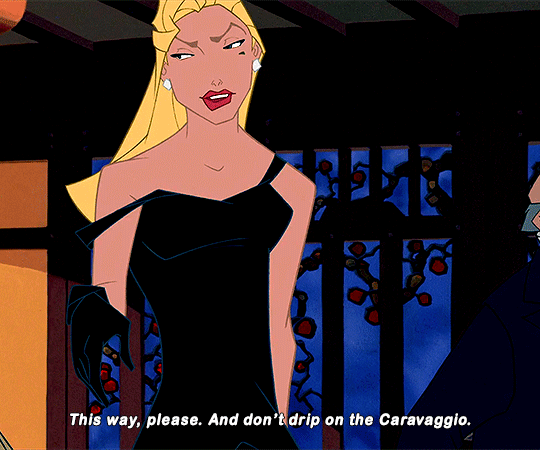
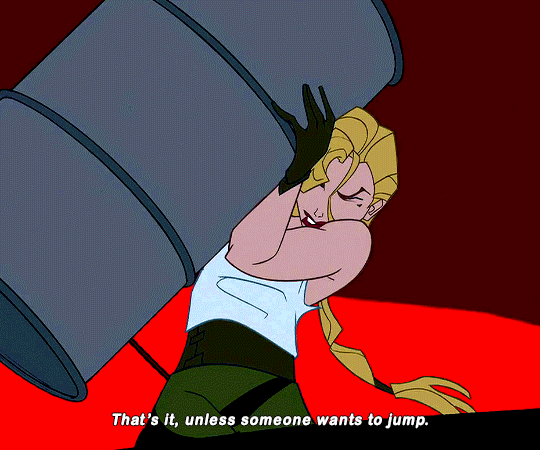
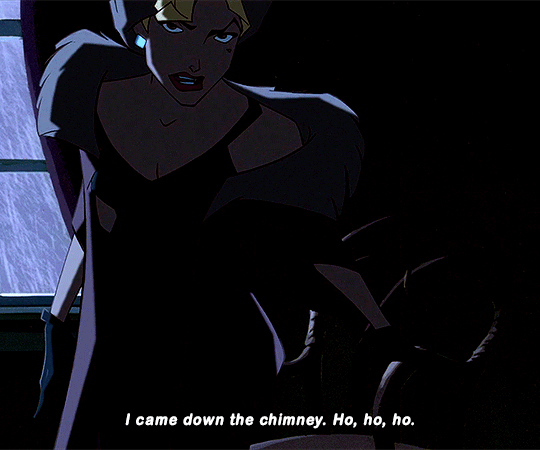
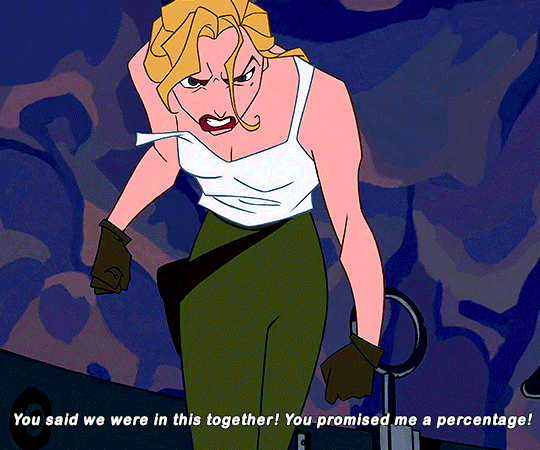

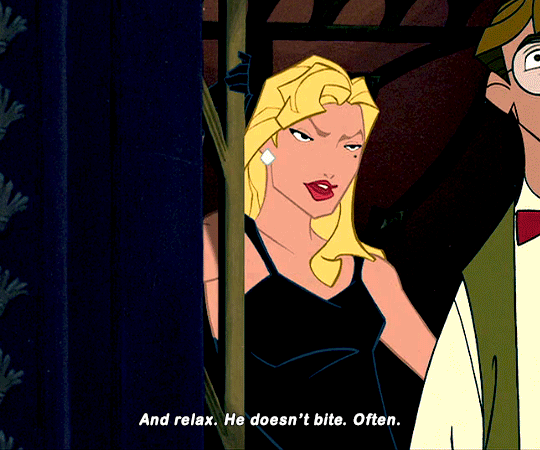

My name is Helga Sinclair. I’m acting on behalf of my employer, who has a most intriguing proposition for you. Are you interested?
ATLANTIS: THE LOST EMPIRE (2001)
151K notes
·
View notes





